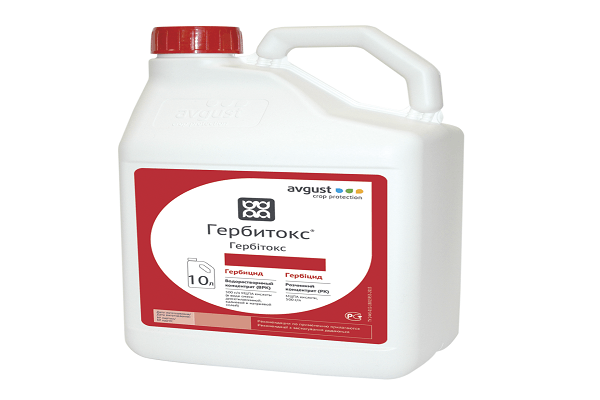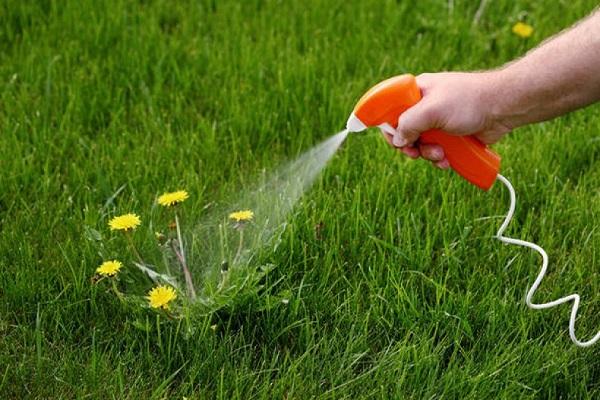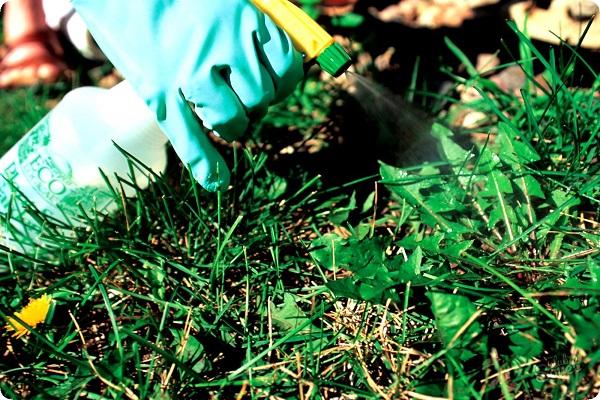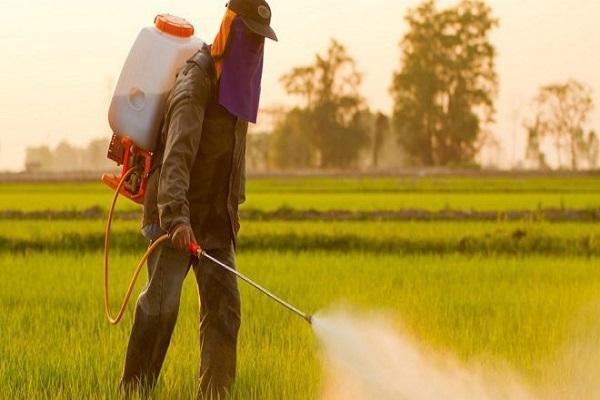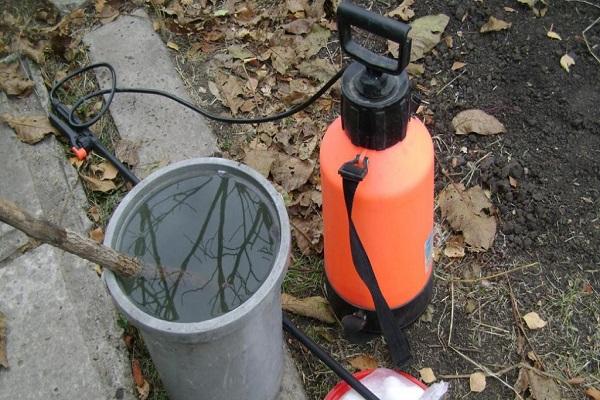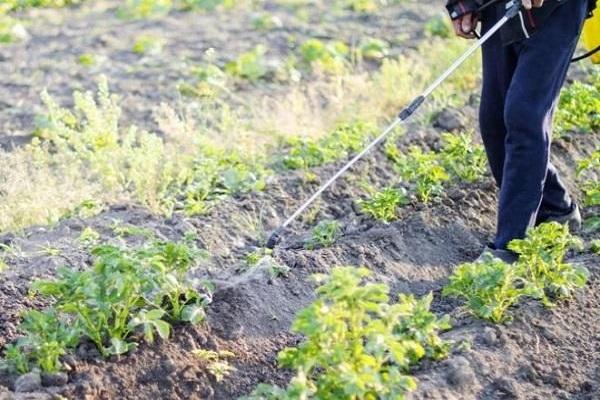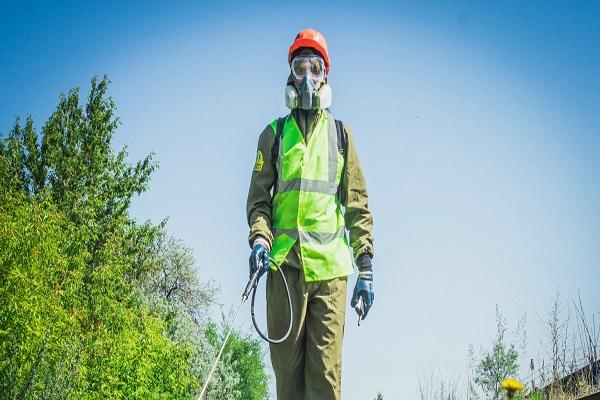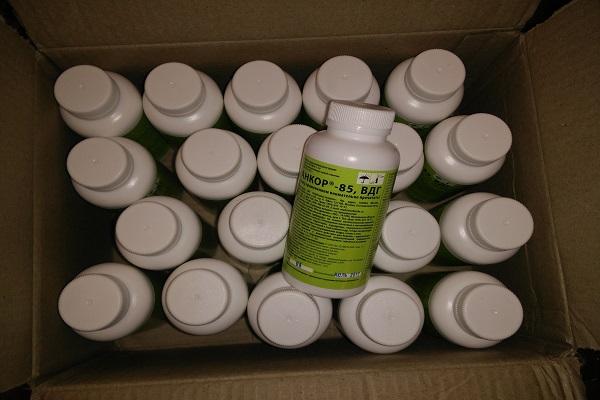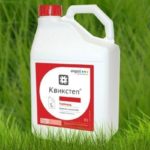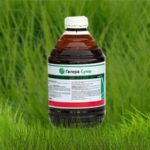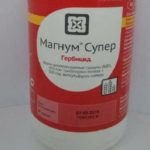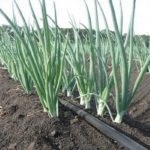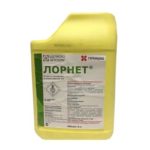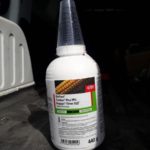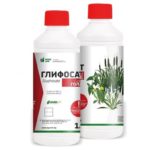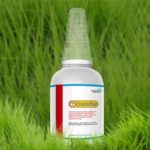The drug is a selective herbicide. Intended for the destruction of weed annuals and perennials growing in areas occupied by cereals, legumes, industrial and fodder crops. When preparing and using the herbicide Herbitox, precautions should be taken, since the drug is highly toxic.
- Active substance and formulation
- What weeds does it destroy?
- How the herbicide Herbitox works
- Impact speed
- Advantages and disadvantages
- Weed killer consumption rates
- How to properly prepare a working solution?
- How to use the ready-made mixture?
- Safety regulations
- Toxicity and compatibility
- First aid for poisoning
- Terms and conditions of storage
- Are there any analogues?
Active substance and formulation
Herbitox is a systemic herbicide that is effective against a large range of weedy dicotyledonous annuals and perennials. Manufacturer: Russian company August.
The active component is MCPA - an acid represented by a compound of potassium, sodium, and dimethylamine salts. The drug is sold in the form of a concentrated water-soluble liquid, poured into 10-liter canisters. The concentration of the active ingredient is 500 g/l.
What weeds does it destroy?
Some weed species are more susceptible to the effects of the herbicide, others less so. The drug has the greatest effect on:
- dandelion;
- sow thistle;
- nettle;
- quinoa;
- water plantain;
- handbag;
- cornflower;
- ragweed;
- rapeseed;
- pigweed;
- clarity;
- reveler;
- piculin;
- clean;
- ragwort;
- jaundice.
Herbitox has a less effective effect on some weed species; it inhibits development, but does not cause death. These are weeds:
- thistle;
- sagebrush;
- chamomile;
- smoke-grass;
- Highlander;
- tar;
- black nightshade;
- chamomile.
How the herbicide Herbitox works
The active substance of the herbicide, once on the leaves of the plant, penetrates into the tissues and inhibits the processes of photosynthesis. As a result, plant cells die.
Impact speed
Signs of weed suppression become noticeable already 3-5 days after treatment. The final death of the weeds is observed after 2-3 weeks. One treatment per growing season is acceptable.
Advantages and disadvantages
Herbicide Herbitox is popular among farmers because it has many advantages:
- effectively destroys the most malicious types of dicotyledonous weeds;
- shows excellent results on areas occupied by cereal crops with the inclusion of clover;
- completely destroys weeds that are in the active growth phase;
- quickly has a depressing effect;
- provides reliable protection until the second wave of weeds in the season;
- compatible with other herbicides.
Farmers do not note any particular shortcomings.
The only caveat is the dependence of the processing efficiency on weather conditions.
Weed killer consumption rates
The application rates for Herbitox are determined by the specific type of cultivated vegetation growing in the treated area.
| Culture | Consumption rate, l/ha | Optimal processing time |
| Winter cereals | 1-1,5 | In spring, during the tillering phase, before the formation of the tube |
| Spring cereals | 0,7-1,5 | At the tillering stage, before tube formation |
| Rice plantation | 1,5 | In the tillering stage |
| Peas for food purposes | 0,5-0,8 | At the stage of 3-4 true leaves, when the stems reach 10-12 cm |
| Linen | 0,8-1 | During the “Christmas tree” formation phase, when the shoots reach 5-10 cm |
How to properly prepare a working solution?
The working solution is prepared before use. Before depressurizing the canister, the concentrate in it is thoroughly shaken.
The tank of the spraying device is filled a quarter with water. Add the required amount of concentrate. The solution is stirred well. The tank is filled with water to the brim with continuous stirring using a mechanical stirrer.
A herbicide solution is prepared and the tanks are filled in a separate area. After refueling, the site is cleaned. The consumption of the working solution is 200-300 liters per hectare.
How to use the ready-made mixture?
For successful processing, weather conditions must be taken into account. The instructions indicate that spraying should be carried out at temperatures up to +20 °C on a rainy day. You should not perform work in hot weather, as the effectiveness of Herbitox herbicide is significantly reduced.Also, you should not start work if precipitation is expected in the coming hours.
The optimal treatment period is the period of mass coverage of the area by weeds at the initial stage of the growing season, when the weed has 2-4 true leaves.
Safety regulations
The drug Herbitox is used to treat large agricultural areas. It is not suitable for use on personal plots or for aerial spraying.
Herbitox is a highly toxic product, so maximum precautions should be taken when working with it. The face, skin, vision and respiratory organs must be protected with appropriate means. It is advisable that the processing is carried out not by a novice, but by someone experienced in the use of chemicals.
It is allowed to carry out mechanized measures 3 days after chemical treatment, manual ones - after a week.
If the pasture was cultivated, then the cattle can be released after 1.5 months.
Toxicity and compatibility
Herbicide Herbitox is included in the 2nd class of danger to humans - a highly toxic substance. For bees and fish, class 3 is a moderately toxic substance. The herbicide can be sprayed in the sanitary zone of reservoirs belonging to fish farms.
To increase the effectiveness of action on dicotyledonous weeds, it is recommended to combine Herbitox with drugs based on sulfonylurea and bentazone.
The following complexes are effective:
- for cereal crops – Herbitox (0.6 l/ha) + sulfonylurea (5 g/ha);
- for flax crops – Herbitox (0.3 l/ha) + sulfonylurea (5 g/ha).
The second component should be added after the first has completely dissolved.During work, it is necessary to periodically stir the complex solution to maintain its homogeneity.
First aid for poisoning
The injured person needs immediate assistance:
- if a toxic substance is inhaled, remove from the room and force to breathe deeply;
- If the chemical gets into your eyes, open your eyelids with your fingers and rinse your eyes with plenty of water;
- in case of contact with the skin, wipe off the chemical with a cotton swab or cloth and wash the skin area with soapy water;
- in case of accidental ingestion - induce vomiting, drink a large amount of warm water, take activated carbon (1 g of medication per 1 kg of weight), repeat the steps if necessary.
Help is not limited to the activities described. The victim should contact a medical specialist. He will conduct symptomatic therapy.
Terms and conditions of storage
Store Herbitox herbicide in the hermetically sealed canister in which it was purchased. It is advisable to choose a warehouse or other closed space for storage. The temperature at the storage location can range from -15 to +40 °C.
Shelf life - 5 years if the canister is not depressurized.
Are there any analogues?
Herbicide Herbitox has analogues based on a similar active substance:
- Agritox;
- Dikopur;
- Agroxon;
- Metaphen;
- Dirk;
- 2M-4X.
The listed drugs are also effective against annual and biennial weeds, are used in areas occupied by cereals, industrial crops, and fodder crops, and are characterized by rapid and long-lasting action.

